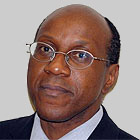Thursday, September 29, 2011
NTC troops encircle Sirte - YouTube
Wednesday, September 21, 2011
Has Africa lost Libya? | Knox Chitiyo | Comment is free | The Guardian
Colonel Gaddafi's overthrow has highlighted the country's Arab heritage and created divisions within the continent
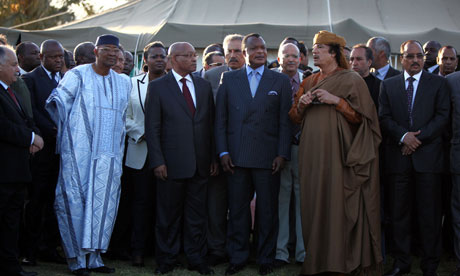
For decades, Libya has been an integral part of Africa. Indeed Sirte, the Colonel Gaddafi stronghold where fighting still continues, was the birthplace of the Organisation of African Unity in 1963. About a quarter of indigenous Libyans are black, while African migrant workers in Libya exceed one million; and during his 40-year rule Gaddafi championed pan-Africanism and African multiculturalism.
But the Libyan uprising, while toppling the old order, has also become an ugly race war. The rebels were angry that black African mercenaries were hired to buttress the old regime – even though most of them were actually migrant workers or indigenous black Libyan soldiers. And a misperception has taken hold of all black Africans being mercenaries which has led to the persecution of African immigrants and black Libyans.
Human Rights Watch and the African Union have called for an end to brutal reprisals, including torture, mass killings and arbitrary arrest. Many attacks seem premeditated. This has led to the question: can Libya still be seen as an "African" country?
The revolution has moved Libya into the democratic wave of the Arab spring. There will be continued interactions between Libya and Africa; but culturally, ideologically and financially, Libya has moved towards a greater identification with its north African, Middle Eastern and south Mediterranean neighbours. Libya is embracing its Arab heritage.
In a way this should be no surprise: Gaddafi's embrace of pan-Africanism, while popular south of the Sahara, had little backing from Libyans. But the question of support for Libya's revolution has divided sub-Saharan Africa.
Only 20 of the African Union's 53 member nations have so far recognised the National Transitional Council. The AU itself has not yet recognised the NTC – the fact that a head of state has been unconstitutionally ousted from power by force is against the AU charter. But in addition there is a genuine sense of grievance that UN Resolution 1973, which authorised "necessary force" to protect civilians, has been used to bring about regime change. And the reprisals against black Africans have stoked anger across the continent. Nevertheless, the outcome of the recent AU meeting in South Africa hints at a likely recognition of the NTC, and a new partnership.
There is much at stake in how this relationship plays out. The NTC will need Africa's assistance to prevent dissidents from using neighbouring countries as bases for new insurgencies. There will also have to be discussions between the NTC and its neighbours on African immigration, including the situation for African refugees – for decades, Libya has been a staging post for African migrants trying to cross the Mediterranean, which has inflamed racial tensions.
In addition there is the threat that, at some point, NTC and rebel military leaders could find themselves arraigned alongside Gaddafi's former commanders, on trial for abuses against civilians.
If Libya is to retain its vital African migrant labour force and African goodwill, it will have to end the pogroms and improve its treatment of indigenous and foreign African workers. But Africa has also had to get real. Libya's role as the ideological and financial engine of Africa has ended, but the continent should not punish the Libyan people for this, or for receiving western support. Libya is their country, after all.
Africa's civil society and business leaders have already recognised that the new Libya is not "owned" by Africa. There are deals to be done, and Africa cannot afford to be on the wrong side of history. The AU needs to understand that its failure to speak out against the use of black mercenaries to kill Libyans, and its heralding of Gaddafi as a "brother leader" during its visit in April, cost it dearly in terms of credibility. Nato air attacks which killed dozens of civilians have rightly been criticised, but Africa also needed to speak out about abuses committed by Gaddafi's forces.
The momentous changes of the Arab spring herald the emergence of a new African dynamic. Pan-Africanist ideals of solidarity and African empowerment continue to resonate; but we may also be moving towards a "post-Africanism" – an Africa which sees itself as part of an interlinked global community. In some ways, we are moving towards an Africa without borders – a globalised Africa. Thus Africa should not wallow in Afro-pessimism about "losing Libya". We never "had" Libya. The new Libya, warts and all, is an opportunity for Africa, not a threat to be punished. Africa should engage with the new Libya and, in so doing, with itself.
Sunday, September 18, 2011
Is NATO Tries to Control Libyan Revolution ? - YouTube
Sirte and Bani Walid. Revolutionaries face fierce fight in Gadhafi's hometown - CNN
Sirte and Bani Walid. Revolutionaries face fierce fight in Gadhafi's hometown - CNN.com
STORY HIGHLIGHTS
- An anti-Gadhafi official predicts "drastic" changes soon in Sirte and Bani Walid
- He says loyalists no longer control parts of Sirte, Gadhafi's birthplace
- "Fierce fighting" is ongoing in the southwestern city of Sabha, he adds
- A "final call" is issued for pro-Gadhafi forces to switch or face "treason" charges
Tripoli, Libya (CNN) -- In an effort to hold onto the few remaining places they still control in Libya, Moammar Gadhafi's forces put up stiff resistance again Saturday as revolutionaries fought to wrest control of the loyalist strongholds of Sirte and Bani Walid.
Fierce fighting erupted in the coastal city of Sirte, the birthplace of Gadhafi and home to his tribe.
At least eight anti-Gadhafi fighters were killed and 31 others were wounded, said Ali Gheliwan, a spokesman for the Misrata Military Council.
NATO planes, meanwhile, bombed targets in the Sirte area Friday. Gadhafi's forces unleashed hails of gunfire, using snipers in tall buildings to target their enemies.
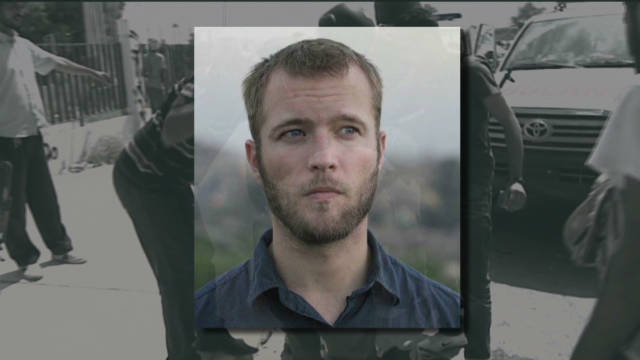 CNN journalist injured in Sirte attack
CNN journalist injured in Sirte attack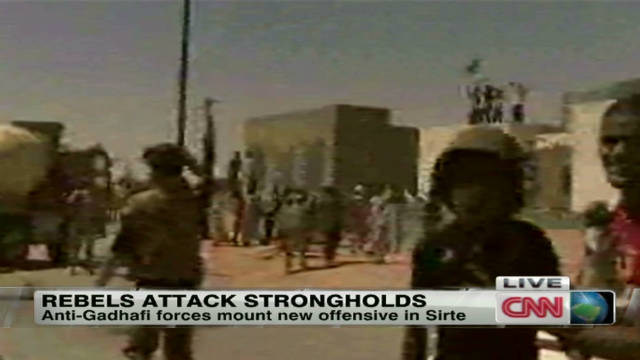 Rebels attack Libyan strongholds
Rebels attack Libyan strongholds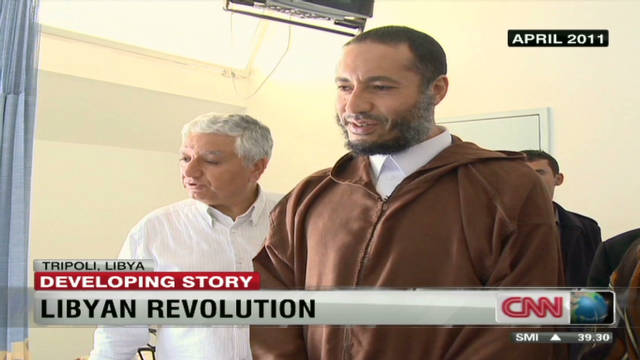 Will Gadhafi's son return to Libya?
Will Gadhafi's son return to Libya?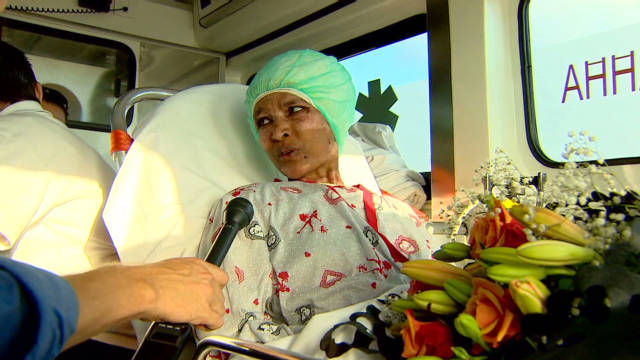 Injured Gadhafi nanny seeks treatment
Injured Gadhafi nanny seeks treatmentExpected support from Sirte residents for the anti-Gadhafi forces did not materialize, as loyalists fought house to house with unexpected intensity. The revolutionaries were forced to retreat after the chaotic urban warfare.
Despite such challenges, Col. Ahmed Bani of the National Transitional Council predicted it will not take long for all of Libya to be under the anti-Gadhafi forces' control. He claimed, for instance, that Sirte's airport and the nearby Ghardabiya air base already have switched hands.
"I can say that things will change drastically in the upcoming days in Sirte and Bani Walid," the group's spokesman said in his first press conference Saturday from Tripoli.
Bani claimed that part of Bani Walid, another loyalist hub located in a mountainous area southeast of Tripoli, is also under anti-Gadhafi forces' control despite stiff opposition. City residents had been fleeing ahead of the offensive, which followed a 48-hour warning.
"We were attacked by rocket-propelled grenades and snipers from the mountains," he said. "We repositioned, and we can say that the north is under control of our revolutionaries."
However, Salah Beniran, a field commander for anti-Gadhafi forces in Bani Walid, said Gadhafi loyalists have taken some residents hostage, "and they are heavily armed with missiles, rocket-propelled grenades and machine-gun-mounted trucks."
"They encircled us from the eastern front," Beniran said.
The clashes contrasted with the scene in several Sahara Desert towns more sympathetic to the revolution, where people cheered the anti-Gadhafi forces as they made their way toward the southern city of Sabha.
In Shati, there was no combat; only a peaceful transfer of power, perhaps the first in the eight-month uprising. In the morning the tiny town had been under Gadhafi's grip. By afternoon, no more.
Residents fired their guns in celebration and burned the green flags of the former regime.
They welcomed the ordinary Libyans -- teachers, doctors, engineers -- who dropped everything to join the fight against Gadhafi. They were rebels once. Now they were the armed wing of Libya's new governing body, the National Transitional Council.
But the situation was different in Sabha, a diehard pro-Gadhafi city in southwestern Libya.
Anti-Gadhafi forces took control of the Al-Birak air base in the city Saturday, but the battle was far from over, Bani said.
"There has been fierce fighting for a while now," the spokesman said. "The people in Sabha are from different tribes. There are a big number of loyalists who escaped from other cities, and they are still fighting."
Bani issued what he called a "final call" for all Gadhafi loyalists to switch sides and join his group, warning that -- if they do not -- they risk being charged with treason."
He added he hopes Gadhafi is in one of the three cities -- Sirte, Bani Walid and Sabha -- still in the throes of heavy fighting Saturday and not yet held by his forces, so that he can be taken into custody.
"We hope he is ... so we can arrest him and give the world a break from his evils," the colonel said. "(Up) until now, there is no certain information about his location."
As these battles continued to rage in Libya, the international community came together to pledge support for the war-torn nation's new leaders in Tripoli.
The United Nations Security Council unanimously adopted a resolution Friday to establish a support mission in Libya for an initial period of three months and to take other measures to help the country get back on its feet.
The mission's mandate includes restoring public security and order and promoting the rule of law, beginning efforts to write a constitution and set up elections, promoting and protecting human rights, and thawing the assets freeze that had been imposed on the Gadhafi's government.
The resolution further asks U.N. Secretary-General Ban Ki-moon to report on its implementation in two weeks and every month thereafter, or more often if he sees fit.
Related articles
- Libyan forces struggle to make gains against Gadhafi strongholds (theglobeandmail.com)
- Libyan fighters inch forward in Gadhafi hometown (abclocal.go.com)
- Libyan fighters don't have certain info on Gadhafi: NTC (ctv.ca)
- Libya ex-rebels advance on Bani Walid again (msnbc.msn.com)
- Fresh Fighting Near Libyan Town of Bani Walid (abcnews.go.com)
Saturday, September 17, 2011
Hope and weapons lessons amid Libyan fighting - CNN.com
---------------------
STORY HIGHLIGHTS
- Wedeman describes traveling with the Libyan fighters
- One of them, a doctor who ran an Audi dealership in Tripoli, shuns the gun
- Would-be fighters gain lessons in the use of heavy machine guns, RPGs
- The convoy got involved in fighting; Wedeman experienced machine gun fire
CNN's Ben Wedeman has been traveling in a convoy, accompanying Libyan fighters trying to take control of the final strongholds of deposed leader Moammar Gadhafi.
Al-Jaloud Airbase, Libya (CNN) -- I'm writing this in the dark on a mattress "liberated" from the officers' quarters on the Jaloud Airbase outside the town of Birak Al-Shati, about 370 miles (600 kilometers) south of Tripoli. My concentration is broken by occasional blasts from small arms and old Russian or Chinese-made anti-aircraft guns.
They are not shots fired in anger, but rather to test the weapons after maintenance. At least that's the generous interpretation. Sometimes it's just bored young men playing with very dangerous toys.
There is no electricity here, no running water, no cell phone service. I haven't showered or shaved or slept in a bed in four days. Thanks to the mattress, at least something will be different tonight.
Dinner this evening was a communal bowl of rice with spicy tomato sauce shared with field commander Hmaida Al-Majri, a soft-spoken, deeply pious 34-year old former law professor, who nonetheless seems to enjoy the company of the distinctly impious, grizzled and dusty CNN crew.
Until a group of journalists from the Associated Press arrived this evening, we were the only media covering this major operation involving hundreds of fighters trying to take control of a huge chunk of this massive land. Not once has Cairo camerawoman Mary Rogers had to seethe over other press wandering into her shots. To have such a story all to ourselves has been a journalist's dream, and we joked with Commander Al-Majri about having the fighters detain any journalists who showed up to ensure we could continue to label our reports "exclusive."
It took two long days to get here. We left Tripoli around mid-day Tuesday with a group of about 40 fighters in pickup trucks and cars. The first night we met up with the main body of the column, about 500 men and around 100 vehicles, on the outskirts of the town of Shwairif. It was dark when we arrived, but we could see scattered camp fires and car lights all around us.
We were greeted enthusiastically by everyone, invited to join them for "embekbeka," spicy Libyan pasta.
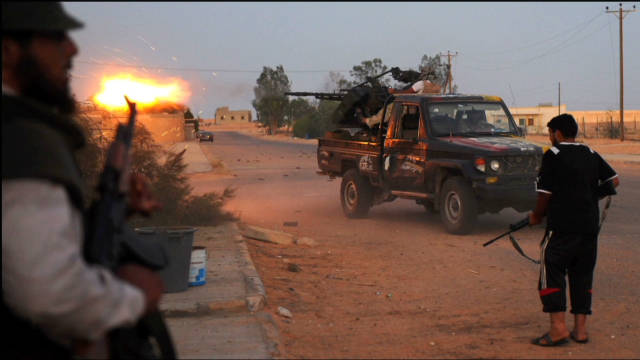 Libyan rebels advance on Sirte
Libyan rebels advance on Sirte Will Gadhafi's son return to Libya?
Will Gadhafi's son return to Libya?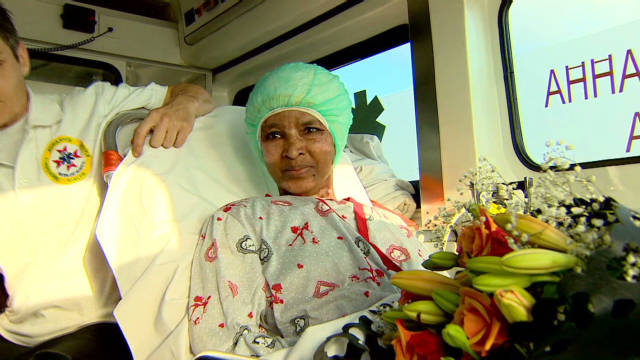 Burned Gadhafi nanny seeks treatment
Burned Gadhafi nanny seeks treatmentI must stay and fight
--Al-Amin Shtawi, aide to field commander Hmaida Al-Majri
"I'm sorry, it's very salty. The man who cooked it put too much salt," an older man in combat fatigues told me.
Like everyone else, we slept on the stony desert floor. I didn't have a sleeping bag but slept wrapped in a blanket on a poncho. It wasn't the most comfortable of nights.
The next morning the campsite was all a bustle. Medics were reorganizing their medicine and equipment, stocking up on water. There I met Hatem Abu Bakr, a young half-Libyan half-German doctor who had given up practicing medicine to run the Audi dealership in Tripoli.
Like so many men his age, he had become frustrated with life under Gadhafi and was inspired by the uprising that began last February. He left his dealership, dusted off his medical books and joined the revolution but had shunned the gun.
"Finally I am proud to be a Libyan again," he told me as he sorted through a box of medicine.
Nearby, Ahmed, a man in his late-20s with a scruffy beard, was giving weapons lessons to a group of around 20 would-be fighters. He started with a heavy machine gun, then a rocket-propelled grenade launcher, then an anti-aircraft gun.
"I'm explaining this to you now, but when there are bullets and bombs all around you, it won't be easy to remember what I'm teaching you," he told the group.
We set off after many false starts at mid-day. With such a large group, progress was slow, and we stopped many times for prayers, for group consultations, for refueling. We finally came to a halt in the late afternoon, pulling up by the side of the road with the medical team.
Around 8 p.m. we moved out again, moving slowly in the blessedly cool desert night. Our progress halted suddenly, however, when a pickup truck screech to a halt in front of one of the ambulances. In the back was a body of a man in military fatigues, his shirt open and his legs splayed. It was the nephew of Gadhafi's intelligence chief, Abdallah Sanousi, killed in a firefight outside the airbase in Birak Al-Shati.
When word spread in our convoy that a battle had broken out ahead of us, the fighters threw containers of heavy machine gun bullets into the road and started prying them open, readying for a fight.
Commander Al-Majri drove up in his black all terrain vehicle and beckoned to us to follow him. One of his aides, Al-Amin Shtawi, was ecstatic. "This is a great day," he declared. "We have taken over the Birak airbase! There's a gym there, and showers too!"
Like so many of the men here, Shtawi has no military experience. He spent the last three years studying banking and finance in Wales and was planning to set up a business in Dubai. When the uprising against Gadhafi erupted, he and his friends collected money to buy an ambulance to send to rebel-controlled Libya. He drove the ambulance from the UK, through France, Italy and then took it by ferry from Naples to Tunis, and from there to Jabal Nafousa in western Libya.
Shtawi's was supposed to deliver the ambulance and then return to Wales, but as soon as he arrived in Libya, he scrapped those plans and joined the rebels.
"Come on, we'll take you to the airbase. You must cover it live," he said, grinning with excitement. "It will be an exclusive!"
So we jumped back in our cramped, uncomfortable van and barreled down the road in the dark. After passing the main body of the force, we found ourselves trailing behind the commander's car, lights off to minimize detection. After driving for around fifteen minutes, we pulled over behind their car. A man jumped out, gun at the ready and crouched, peering around in the dark. Suddenly we heard an explosion about 300 meters on the other side of the road. There were three more loud, bright explosions in quick succession. On the horizon I could see tracers floating eerily skyward.
"You must go back, it's not safe here," commander Al-Majri said, stating the uncomfortably obvious.
So we scrambled back in our vehicle and drove, again with lights off, with speed back in the direction we came in.
Along the way we saw what I had seen so many times in this war. Suddenly the forward surge of enthusiastic fighters bellowing "Allahu akbar" seemed to lose momentum, and at first imperceptibly then dramatically, started to turn into a head-long retreat.
When we slowed down, I watched as six young men, all unarmed, jumped on the back of our second vehicle, a pickup truck, desperate for a ride out of harm's way. Next to us, a minibus drove by, several forlorn-looking teenagers looking at us with a mixture of fear and uncertainty.
"They're firing grad rockets at us," said one of the teenagers, seemingly offended that the prospect of glory was rudely sullied by unforeseen resistance.
We drove and drove until we came upon a man in the road signaling all retreating vehicles to pull over and make camp. By now it was well past midnight. With all the stopping, starting and retreating, we hadn't had time to broadcast our report, so our night was still far from over.
Wearily we laid out our blankets and sleeping bags in the sand, hoping for a few hours of peace.
It wasn't to be. At 5 a.m., a pickup truck speeded into the camp site.
"A column of vehicles is coming up the road! Wake up! Get out of here! It could be Gadhafi's forces!"
With amazing speed and little hesitation, we jumped to our feet and scrambled to pack up, a task achieved in record time, and sped away.
As it turned out, there was no enemy column heading our way. Inexperienced fighters had panicked at the sight of a car with its lights on. Exhausted and addled, we returned to our original location and tried to catch a few more hour's sleep before the sun rose and the heat set in.
When we finally woke up, we found that, in the daylight, spirits had risen and courage returned. The airbase had come under steady rocket attack, but the rebels managed to hold it and seemed to have regained their momentum.
At an intersection, we found the fighters once more in boisterous mood. There we met Hashim, a 40-something, bandana-wearing dental technician from Tripoli and an enthusiastic Bruce Springsteen fan.
"We're going to get that bastard Gadhafi, man!" he told me in oddly colloquial American-accented English, waving his AK-47 machine gun. "We've had enough of his sh**."
Our plan was to get to the newly-liberated airbase, but a large column of smoke coming from that direction hinted that all was not well there. We drove up the road in that direction, all the while hearing massive explosions. The cause was burning ammunition, thousands of artillery and mortar shells buried underground next to the entrance of the base.
We stopped and filmed it for a while but were interrupted when a pickup truck stopped next to us. The driver called out, asking if we had water. But it wasn't for him. It was for a dejected looking man in the back, his left wrist handcuffed to an unloaded heavy machine gun mounted on the back.
Abu Azoum Saqr was a loyalist fighter captured near the town of Birak Al-Shati. He told us he had spent time on the nearby airbase, and that he had overheard officers there talking about rockets filled with mustard gas. It seemed far fetched, but the prospect of being down-wind from a huge fire on a military instillation with mustard gas was a bit disconcerting.
So we headed back to the intersection, about eight kilometers back down the road, where we were treated to the ubiquitous Turkish cupcakes and little boxes of fruit juice. The juice, like the water, always warm due to the absence of refrigeration.
Shortly afterwards Al-Amin Shtawi, who the night before had been so eager to take us to the airbase, offered to accompany us to the town of Birak Al-Shati, which he insisted was now safely in the hand of National Transitional Council fighters.
As we drove into the town, a postcard oasis community, we saw fighters in friendly banter with a knot of locals. I spoke with Masoud Hasnawi, a dignified older gentleman who told me he had been part of the underground anti-Gadhafi opposition since 1983.
I asked him if there were still parts of town loyal to the deposed Libyan leaders. He started ticking off one neighborhood after another, pointing in every direction. When the interview was over Kareem the producer waved for camerawoman Mary Rogers and me to join him at an ambulance.
I took about one step in his direction when I heard a whoosh over my head and then a blast. I hit the dirt, just in time, as the fighters opened fire with everything they had. As I lay on the ground, I was deafened by the blast of machine gun fire all around me.
This went on for a good fifteen minutes. The only one hurt was producer Kareem, who was hit on the arm by a burning shell casing from the 50-caliber machine gun blasting away just behind him.
As soon as the shooting subsided, we stood up, dusted ourselves off and bade a hasty farewell.
Our host, Al-Amin Shtawi, bashfully apologized for leading us into the firefight, but declined our offer for a drive to safety.
"I must stay and fight," he said, shaking my hands goodbye.

